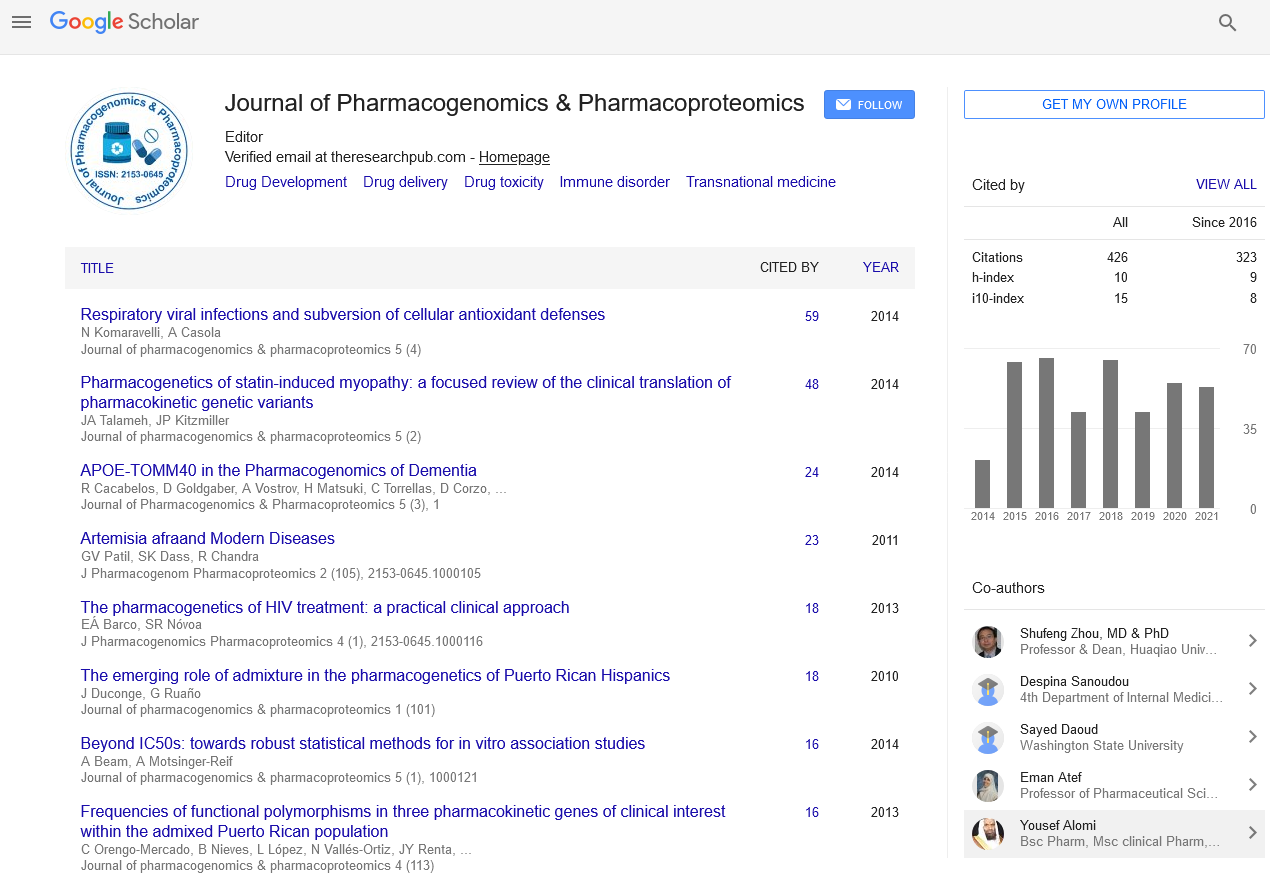Indexed In
- Open J Gate
- Genamics JournalSeek
- Academic Keys
- JournalTOCs
- ResearchBible
- Electronic Journals Library
- RefSeek
- Hamdard University
- EBSCO A-Z
- OCLC- WorldCat
- Proquest Summons
- SWB online catalog
- Virtual Library of Biology (vifabio)
- Publons
- MIAR
- Euro Pub
- Google Scholar
Useful Links
Share This Page
Journal Flyer

Open Access Journals
- Agri and Aquaculture
- Biochemistry
- Bioinformatics & Systems Biology
- Business & Management
- Chemistry
- Clinical Sciences
- Engineering
- Food & Nutrition
- General Science
- Genetics & Molecular Biology
- Immunology & Microbiology
- Medical Sciences
- Neuroscience & Psychology
- Nursing & Health Care
- Pharmaceutical Sciences
T cell receptors genetically linked to CD28 and CD3ε do not mis-pair with endogenous TCR chains and mediate enhanced T cell persistence and anti-melanoma activity
2nd International Conference on Predictive, Preventive and Personalized Medicine & Molecular Diagnostics
November 03-05, 2014 Embassy Suites Las Vegas, USA
Reno Debets, Coen Govers, Zsolt Sebesty?n, J?nos Roszik, Mandy van Brakel, Cor Berrevoets, ?rp?d Sz?őr, Konstantina Panoutsopoulou, Marieke Broertjes, Tan Van, Gy?rgy Vereb and J?nos Sz?llősi
Accepted Abstracts: J Pharmacogenomics Pharmacoproteomics
Abstract:
Adoptive transfer of T cells that are gene-engineered to express a defined T cell receptor (TCR) represents a feasible and promising therapy for patients with tumors. TCR gene therapy, however, is challenged by a transient presence and effectiveness of transferred T cells, which is anticipated to be improved by adequate T cell co-stimulation. Here, we report the identification and characterization of a novel two-chain TCR linked to CD28 and CD3ε, i.e., TCR:28ε. This modified TCR demonstrates enhanced binding of peptide-MHC and mediates enhanced T cell function following stimulation with peptide when compared to wild type (wt) TCR. Surface expression of TCR:28ε depends on the transmembrane domain of CD28, whereas T cell functions depend on the intracellular domains of both CD28 and CD3ε, with IL-2 production showing dependency on CD28:LCK binding. TCR:28ε, but not wt TCR, induces detectable immune synapses in primary human T cells, and such immune synapses show significantly enhanced accumulation of TCR transgenes and markers of early TCR signalling such as phosphorylated LCK and ERK. Importantly, TCR:28ε does not show signs of off-target recognition as evidenced by lack of TCR mis-pairing as well as preserved specificity. Notably, when testing TCR:28ε in immune competent mice, we observed a drastic increase in T cell survival, which was accompanied by regression of large melanomas with limited recurrence. Our data argue that TCR transgenes that contain CD28, and thereby may provide T cell co-stimulation in an immune-suppressive environment, represent candidate receptors to treat patients with tumors.
Biography :
Reno Debets is heading the laboratory of Tumor Immunology, Department of Medical Oncology at the Erasmus MC Cancer Institute, Rotterdam, The Netherlands (since 2000). Also, she is a certified Immunologist (since 2005) and an Associate professor (since 2010). Her research aims at the development and implementation of T cell therapies directed against solid tumors. In addition, the interplay between immune cells and the tumor milieu represents one of my major research aims. Her laboratory takes part in international consortia, clinical trials and immune monitoring, and consists of 12 people, including PhD students. She has received her MSc degree and PhD cum laude, worked at DNAX Research Institute, Palo Alto, CA (currently part of Merck laboratories), published over 85 papers, and got awarded multiple (inter)national grants.


